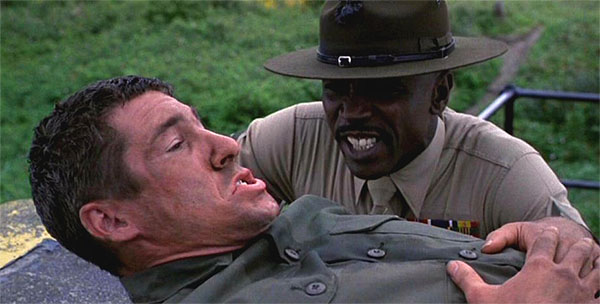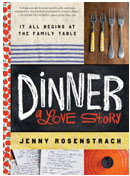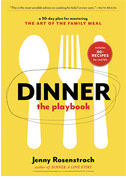You know when you go to someone’s house for dinner and you walk out of the house three hours later thinking, We might have some room for improvement, parenting-wise? That’s what happened last summer when we went to visit our friends, Will and Alaina, and their excellent kids, Eli and Bee. Will is a freshly-retired 20 year veteran of the US Navy who spent several years deployed to Iraq and Afghanistan as a forward air controller, and man: to borrow a vaguely military-sounding phrase I heard once, that family had their sh*t locked down tight. Their kids greeted us, smiling, at the door. Eye contact was unwavering. Conversation: superb. Engagement: total. And the most impressive thing of all? When dinner was over, the kids rose from their chairs, cleared the table, and — it never gets old — cleaned up the entire kitchen without being asked. It’s been exactly one year since that night, and Jenny and I are still talking about it, still marveling at the precision and can-do spirit of the whole operation. So we asked Cmdr. Mackin, who in addition to his military career, happens to be a supremely talented writer of fiction, to let us in on his secret. He went deep. — Andy
As I transition from a Navy career to life as a full-time writer, I’m lucky to have Andy as an editor and friend. As the editor of my forthcoming collection of short stories, he’s helped me find direction in jumbled piles of miscellaneous thoughts. As a friend, he’s imparted essential knowledge regarding the publishing world (e.g. former editors at fancy men’s magazines do not necessarily have organized closets full of beautiful Italian shoes) that would’ve otherwise taken me years to gain. I like to think I’ve returned the favor, in part, by disabusing him of certain notions regarding the military.
One of those notions is this: Andy is under the impression that my two teenage kids do the dishes because I’ve subjected them to military-style discipline. But the fact is, I’ve rarely exercised military-style discipline in the Navy, let alone at home.
Like other branches of service, the Navy is made up of people from all over the country, each of whom has his or her own ideas about right and wrong, good and evil, not to mention the best way to go about “training and equipping combat-ready maritime forces capable of winning wars, deterring aggression, and maintaining freedom of the seas,” as the Navy’s official mission statement goes. To that end, the establishment of a baseline of acceptable behavior among individuals who must learn to trust each other with their lives strikes me as a good idea.
My first exposure to military discipline came at the hands of Gunnery Sergeant Wise, who, back in 1988, indoctrinated me into the Navy. The first thing he taught me, as I climbed off the bus from Slimesville, was how to stand at the position of attention. Next, he explained that in moving forward, one must step off with the left foot and never the right. I screwed this up over and over, not only because I was nervous, but because I never thought it made any difference. Wise corrected me: left is left, and right is right. Take your first step with one and you begin a journey of a thousand miles. Take your first step with the other, and while you suffer the pain of push-ups, mountain-climbers, and eight-counts, you cover no ground.
As a parent, whose mission statement might read “to produce good human beings,” I want my kids to do the right thing, and to do it well, and for the right reasons. Ideally, they’d have their own motivations to do so beyond fear of reprisal. As it turns out, though, self-motivation is not innate. In order to encourage its development, my wife Alaina and I have enforced time-outs and longer periods of house arrest. We’ve taken away iBots, PS720’s, and Bedazzlers. We’ve made our children scrub toilets, pull weeds, and chisel the sludge from the dark corners of the litter box. But our forays into coercion are often born of frustration. As such, they tend to be subjective, unmeasured, and worst of all, inconsistent.
***
Saturday, July 13th, 2013. 5:20 p.m. I’d been telling the kids over and over, but it hadn’t sunk in. So ten minutes before our guests were scheduled to arrive, we reviewed who they were and why they were coming: My recent story in The New Yorker had won me an agent. My agent had landed me a book contract. Andy was the editor of that book. Jenny was his wife (and also — as I’d soon find out from Jenny herself, as she stood in my kitchen, while the appetizers that my wife had left me in charge of while she showered burned on the grill — the person behind this blog).
“And writing the book is going to be your job after your retire from the Navy, right?” asked my daughter, Bee.
“Right,” I said.
There followed a profound silence, as Bee and her younger brother, Eli, contemplated what life would be like with dad-as-writer versus dad-as-Navy-guy.
In that sense, Andy and Jenny were like visitors from the future. I might’ve hoped that they’d bring lotto numbers and stock tips. But like responsible visitors from the future, they didn’t. As a result, none of us got rich, but neither were we sucked into a quantum vortex to live for eternity in a paradoxical world void of consequence.
The kids paid close attention to our guests, and how we interacted with them. If I were to hazard a guess as to their observations, they might say that people from the future were just as curious about us as we were about them. They might say that future humans asked good questions, and listened thoughtfully to our answers. The younger ones liked to run in circles, crack wise, and laugh, just like them. And the way in which future parents tried to feel their way through the unknown as best they could, while remaining as optimistic as possible, was the identical strategy employed by parents of the present.
Dinner went well.
A few days after Andy returned to his office in New York, he called. “How’d you do that?” he asked.
I thought he was talking about the delicious steak and roasted potatoes. Full credit: Alaina.
“No, dude, the dishes. How’d you get your kids to do the dishes?”
I did not know. So that night, while Eli brilloed emulsified bolognese off of a saucepan, I asked him: “Eli, why do you do the dishes?”
“Because you told me to do the dishes,” he said.
The elegance of my son’s reply was not lost on me. Imagine him asking me 999,999 times why he can’t upgrade his PS720 to a PS721. I might say “Because it’s too expensive,” or “Because you already waste enough time on that thing,” or “Because you should read a book instead.” Now, imagine him asking for the millionth time. My ability to reason is crippled. I no longer understand the difference between why and why not, let alone zero and one. And I say, “Because I said so,” which is basically the reciprocal of Eli’s answer to me regarding the dishes.
After posing the same question to Bee and receiving the same response, I realized that our kids don’t know why they do the dishes, either, and I resigned myself to not knowing.
***
Weeks and months pass. Each night brings a wonderful dinner, and a not-so-wonderful aftermath. Think lobster pot coated with farfalle slime. Goat cheese welded to an iron skillet. Sub-atomic bits of garlic clogging the holes of the garlic press. Bulletproof cornflakes on the ramparts of a cereal bowl, raspberry seeds lodged in the blender bearings, and the detritus of every conceivable ingredient jammed into every poorly designed recess of every confounding component of our thousand-piece food processor.
The kids load the dishwasher methodically — plate matched to plate, glass to glass, bowls overlapping, knives and forks business-end down. They hand wash what’s left in hot, soapy water. They towel-dry skillets, saucepans, and colanders, then hang them on hooks. They stack plates in the cupboard. They throw cans and jars in the recycling, lemon wedges and beet tops in the compost. They scrape gristle into the dog bowl, sweep the floor, start the dishwasher, and carry the trash outside.
Nights in the high desert of New Mexico, every star is visible. Coyotes cry like babies. The kids dump the garbage into the trashcan at the side of the house, and owls fall silent. Back inside, they lock the door behind them. They turn the lights out and listen to the dishwasher churn in the dark, and they feel that chill.
I know they feel that chill because when they shiver it transmits like a yawn, and I feel it, too. It is the chill that comes after taming disorder, when everything that has a place is in its place. If the Navy has taught me anything else, it’s that there is no vanquishing disorder, but there is honor in the fight. — Will Mackin









You guys have some cool friends. Maybe Will can visit my family for a week and help us (cause god knows, we need it)… Great post, thx
Such an inspiring post! I got chills reading the last 2 paragraphs. Wow. Inspiring!
For the rest of the day, I’ll be dreaming about my 2 year old growing up doing dishes, helping to tame the disorder. 🙂
I love everything about this.
Reading this, I can hear our dishwasher churning in the semi-tidy kitchen and I wish you could send those wonderful two over – fancy a few weeks in Germany? Inspirational.
Great post! I’m trying to get my 13yo to learn to help clean up after dinner regularly. She does clean a bathroom great though!
I have so much to learn from this. Hope it is not too late!
I love you guys. I love your people. I can’t wait to buy his book. This is good writing. And good child rearing.
I just want to chime in here and say, if you guys like this piece, Will’s New Yorker short story (which we linked to) is really worth your time. Dude can write!
Lovely! We’re an Army family & I’ve seen this sort of ethic evident in military families with older children than our own. Even our kindergartner is a great helper, I think in part because he understands that we’re all in this life together as a team. And as a team, we get the work done.
The spirits of precision and imagination are so alive in this post and the New Yorker story. I am in awe. Thank you Cmdr. Mackin.
As soon as I saw the photo of Richard Gere from my one of my favorite movies, I knew this was going to be an awesome post. I love the last line. “Vanquishing disorder” sounds so much more honorable than cleaning up a mess.
What a great writer, with an excellent attitude toward educating/growing his children.
I love everything about this! Beautifully written–I love taming the disorder!
Enjoyed this post a lot, though I need way more details on the how part, especially how to get kids to do all this without complaining, but mostly I loved Will’s short story in the New Yorker. Fantastic.
-Dana
This is just so good. I may spend the next ten years quoting him.
Thanks for this well written guest turn. My husband was in the Navy and has this same no-nonsense approach to the order of every day things. I will have to ask him about left foot first.
Thank you soo much for sharing these moments and recipes..:)
I’ve figured out that, with kids, they WILL do things if you ask. And by asking, you do them a favour because that is how they learn to be independent.
This is impressive. I hope to get my kids there someday but first I think I need to get myself and my husband there first! *hangs head in shame*
This was wonderful and the New Yorker story is simply fascinating. Cmdr. Mackin is quite an impressive writer. Although my children are grown, I hoped to glean some insight in this article but there weren’t a lot of details on the “how” portion. I get that though. You don’t always know exactly what you did, just a general philosophy of how things ought to be and somehow you convey that and make it work. I realized that when my youngest son graduated from USMC boot camp at Parris Island. The first thing he said to me after 13 weeks was, “Mom, you could make Marines.” Thanks, son.
Hey Will! Just dropped to say hi!
Your Greek friend George from ASO course in 2002 in Monterey, CA.
Glad to see your family!
George Marangoudakis
gemara2@hotmail.com